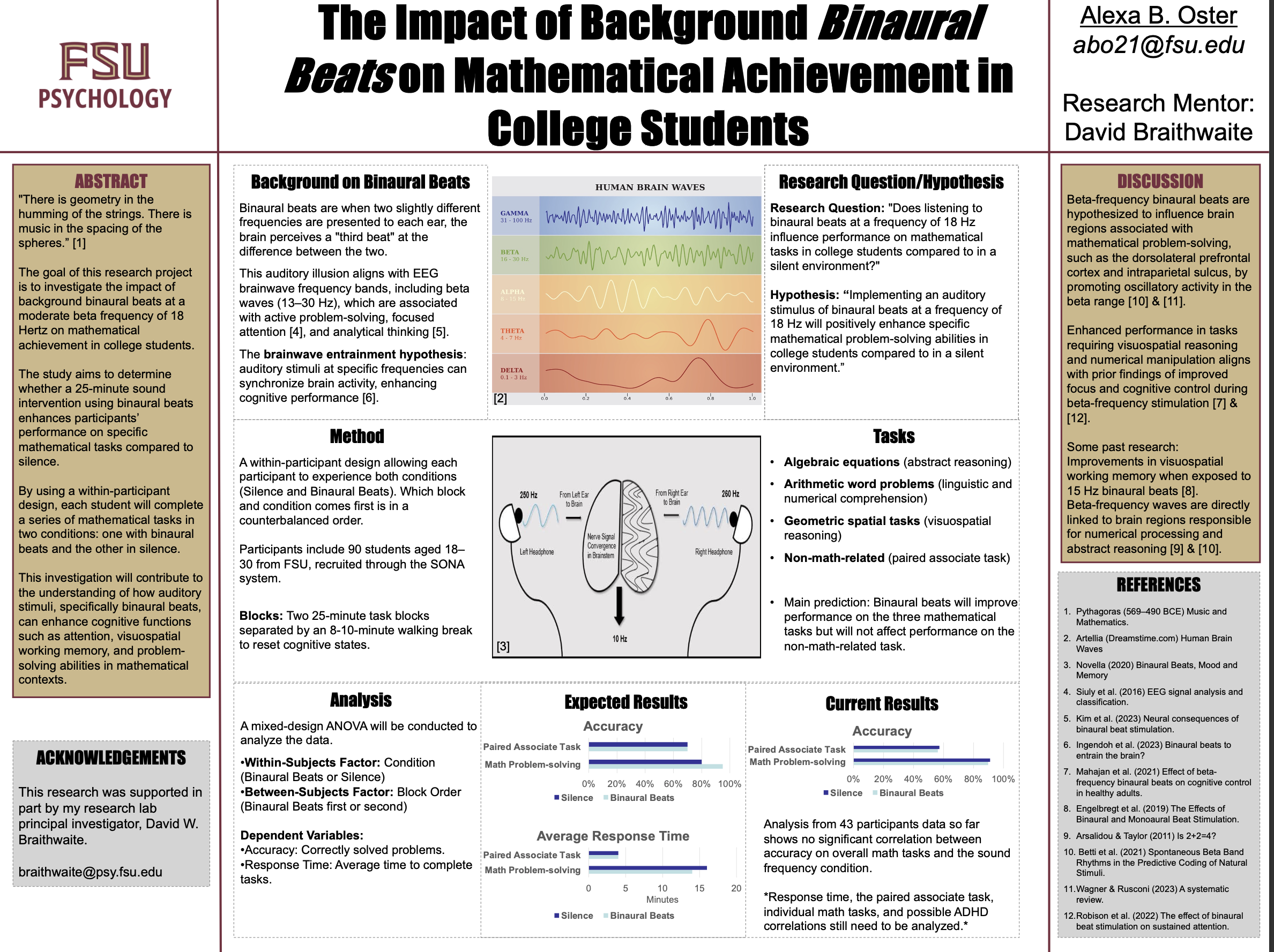Research Symposium
25th annual Undergraduate Research Symposium, April 1, 2025
Alexa Oster Poster Session 3: 1:45 pm - 2:45 pm/ Poster #6

BIO
While growing up, mathematics was always my favorite and strongest subject in school. In high school, I took an AP Psychology course that opened my eyes to the world of neuroscience and the unconscious workings of the brain. I continued with the same inspiring teacher for AICE AS/A-Level Psychology and a college-level research course, which deepened my interest. When I discovered Dr. Braithwaite’s Queen of Sciences Lab before starting my junior year at FSU, I was immediately intrigued. For the past two years, I’ve had the privilege of working under his mentorship, where I’ve been encouraged to explore my own research interests. Dr. Braithwaite has supported me in conducting my independent study, which combines my love for mathematics with my fascination for unconscious brainwave activity.
After completing my undergraduate studies, I plan to pursue a career focused on research and holistic practices in neuroscience. I’m especially interested in how brainwave entrainment, dreams, and personal introspection can support mental health, cognition, and self-discovery. I believe cognition plays a vital role in well-being, and I’m passionate about studying how unconscious processes shape our thoughts and behaviors.
The Impact of Background Binaural Beats on Mathematical Achievement in College Students
Authors: Alexa Oster, David BraithwaiteStudent Major: Behavioral Neuroscience
Mentor: David Braithwaite
Mentor's Department: Psychology Mentor's College: College of Arts and Sciences Co-Presenters:
Abstract
The goal of this research is to investigate the impact of background binaural beats at an 18 Hz beta frequency on mathematical achievement in college students. This study examines whether a 25-minute sound intervention with binaural beats enhances performance on mathematical tasks compared to silence. Using a within-participant design, students will complete mathematical tasks under two conditions: one with sound frequency and one in silence. This research aims to contribute to understanding how auditory stimuli can influence cognitive functions such as attention, visuospatial working memory, and problem-solving. Binaural beats are auditory illusions created when two slightly different frequencies are presented to each ear, resulting in the perception of a third frequency corresponding to their difference. These beats can synchronize with brainwave activity. This study will utilize an 18 Hz sound frequency, falling within the beta range (13–30 Hz), which is associated with active thinking, focused attention, and problem-solving. Tasks include algebraic equations, arithmetic word problems, and geometric spatial tasks, chosen for their reliance on diverse cognitive processes, alongside a control, a non-math related paired associate task. Neuroimaging studies suggest that regions such as the dorsolateral prefrontal cortex, and intraparietal sulcus, critical for mathematical reasoning, exhibit beta oscillations during these tasks. Auditory stimulation through binaural beats is a promising yet under-explored area in cognitive psychology. By assessing accuracy and response time, this study seeks to determine whether 18 Hz binaural beats improve mathematical performance through brainwave entrainment, offering insights into the potential of auditory stimuli as a cognitive enhancement tool.
Keywords: Mathematics, Sound, Binaural Beats, Brainwave Entrainment


